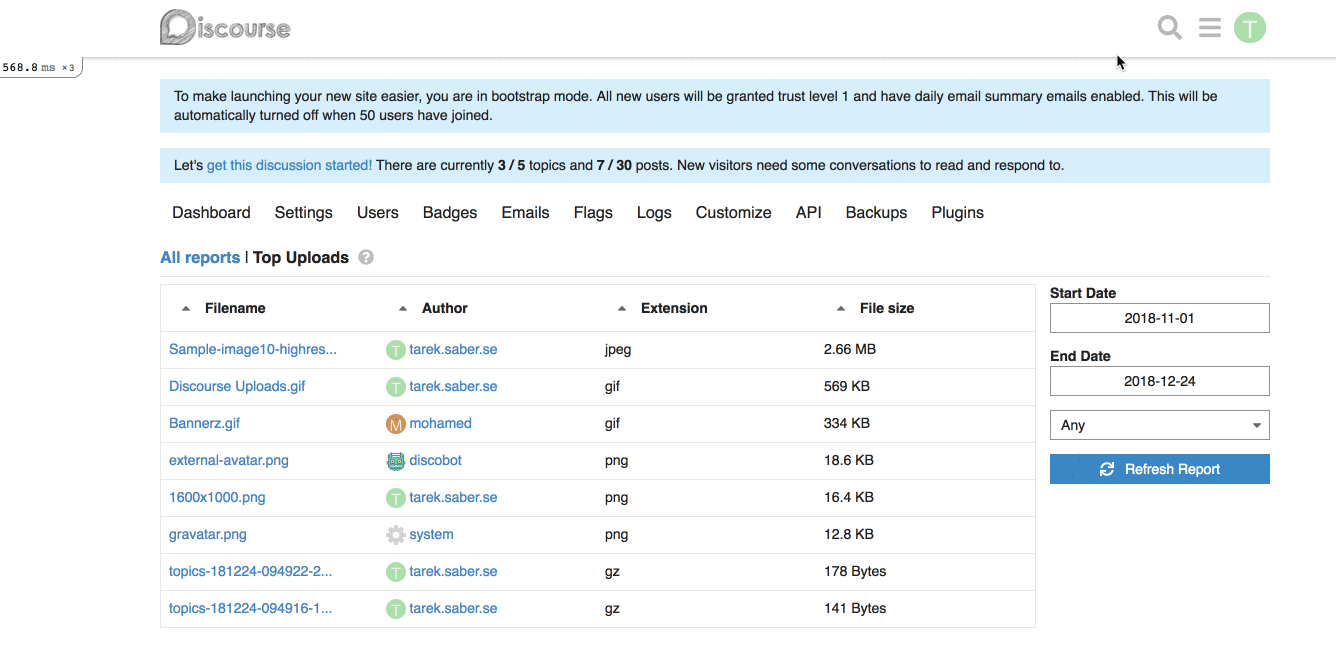This commit contains 3 features:
- FEATURE: Allow downloading watched words
This introduces a button that allows admins to download watched words per action in a `.txt` file.
- FEATURE: Allow clearing watched words in bulk
This adds a "Clear All" button that clears all deleted words per action (e.g. block, flag etc.)
- FEATURE: List all blocked words contained in the post when it's blocked
When a post is rejected because it contains one or more blocked words, the error message now lists all the blocked words contained in the post.
-------
This also changes the format of the file for importing watched words from `.csv` to `.txt` so it becomes inconsistent with the extension of the file when watched words are exported.
* Revert "Revert "FEATURE: admin/user exports are compressed using the zip format (#7784)""
This reverts commit f89bd55576.
* Replace .tar.zip with .zip
* FEATURE: Allow customization of robots.txt
This allows admins to customize/override the content of the robots.txt
file at /admin/customize/robots. That page is not linked to anywhere in
the UI -- admins have to manually type the URL to access that page.
* use Ember.computed.not
* Jeff feedback
* Feedback
* Remove unused import
* FEATURE: admin/user exports are compressed using the zip format
* Update translations. Theme exporter now exports .zip file. Theme importer supports .zip and .gz files
* Fix controller test, updated locale and skip saving the csv export to disk
This allows you to temporarily disable components without having to remove them from a theme.
This feature is very handy when doing quick fix engineering.
* Expose a new plugin outlet. Pass group model to the group-member-dropdown so it can be accessed by plugins
* Added controller tests for group custom fields. update custom fields when updating a group
This reduces chances of errors where consumers of strings mutate inputs
and reduces memory usage of the app.
Test suite passes now, but there may be some stuff left, so we will run
a few sites on a branch prior to merging
If you turn it on now, default all users to approved since they were
previously. Also support approving a user that doesn't have a reviewable
record (it will be created first.)
This also includes a refactor to move class method calls to
`DiscourseEvent` into an initializer. Otherwise the load order of
classes makes a difference in the test environment and some settings
might be triggered and others not, randomly.
Conversely, if a user is deactivated the reviewable should automatically
be rejected.
Before this fix, if a user was not active they'd still show in the
review queue but without an "Approve" button which was confusing.
Includes support for flags, reviewable users and queued posts, with REST API
backwards compatibility.
Co-Authored-By: romanrizzi <romanalejandro@gmail.com>
Co-Authored-By: jjaffeux <j.jaffeux@gmail.com>
- The test_email job is removed, because it was always being run synchronously (not in sidekiq)
- 34b29f62 added a bypass for critical emails, to match the spec. This removes the bypass, and removes the spec.
- This adapts the specs for 72ffabf6, so that they check for emails being sent
- This reimplements c2797921, allowing test emails to be sent even when emails are disabled
* FEATURE: Exposing a way to add a generic report filter
## Why do we need this change?
Part of the work discussed [here](https://meta.discourse.org/t/gain-understanding-of-file-uploads-usage/104994), and implemented a first spike [here](https://github.com/discourse/discourse/pull/6809), I am trying to expose a single generic filter selector per report.
## How does this work?
We basically expose a simple, single generic filter that is computed and displayed based on backend values passed into the report.
This would be a simple contract between the frontend and the backend.
**Backend changes:** we simply need to return a list of dropdown / select options, and enable the report's newly introduced `custom_filtering` property.
For example, for our [Top Uploads](https://github.com/discourse/discourse/pull/6809/files#diff-3f97cbb8726f3310e0b0c386dbe89e22R1423) report, it can look like this on the backend:
```ruby
report.custom_filtering = true
report.custom_filter_options = [{ id: "any", name: "Any" }, { id: "jpg", name: "JPEG" } ]
```
In our javascript report HTTP call, it will look like:
```js
{
"custom_filtering": true,
"custom_filter_options": [
{
"id": "any",
"name": "Any"
},
{
"id": "jpg",
"name": "JPG"
}
]
}
```
**Frontend changes:** We introduced a generic `filter` param and a `combo-box` which hooks up into the existing framework for fetching a report.
This works alright, with the limitation of being a single custom filter per report. If we wanted to add, for an instance a `filesize filter`, this will not work for us. _I went through with this approach because it is hard to predict and build abstractions for requirements or problems we don't have yet, or might not have._
## How does it look like?

## More on the bigger picture
The major concern here I have is the solution I introduced might serve the `think small` version of the reporting work, but I don't think it serves the `think big`, I will try to shed some light into why.
Within the current design, It is hard to maintain QueryParams for dynamically generated params (based on the idea of introducing more than one custom filter per report).
To allow ourselves to have more than one generic filter, we will need to:
a. Use the Route's model to retrieve the report's payload (we are now dependent on changes of the QueryParams via computed properties)
b. After retrieving the payload, we can use the `setupController` to define our dynamic QueryParams based on the custom filters definitions we received from the backend
c. Load a custom filter specific Ember component based on the definitions we received from the backend